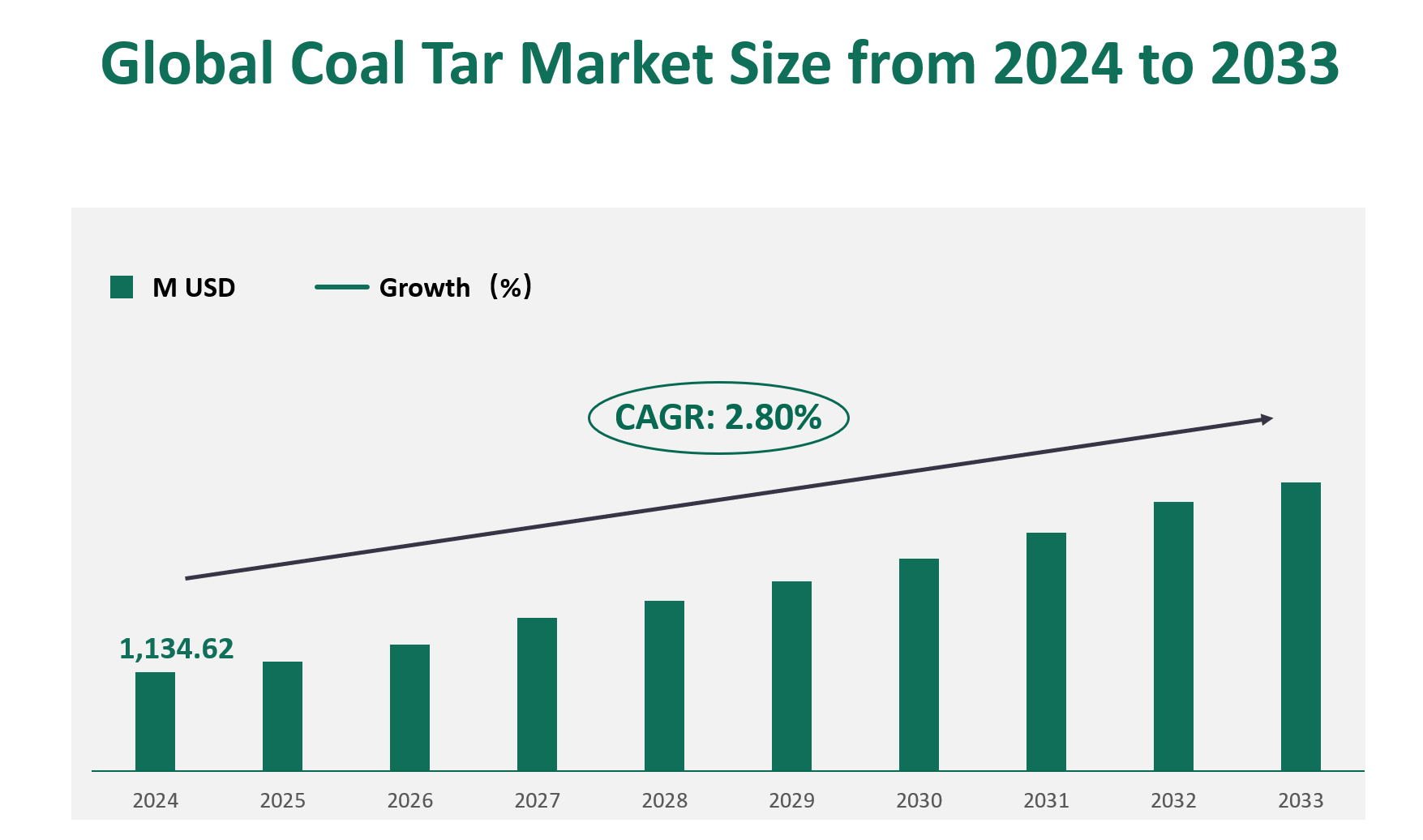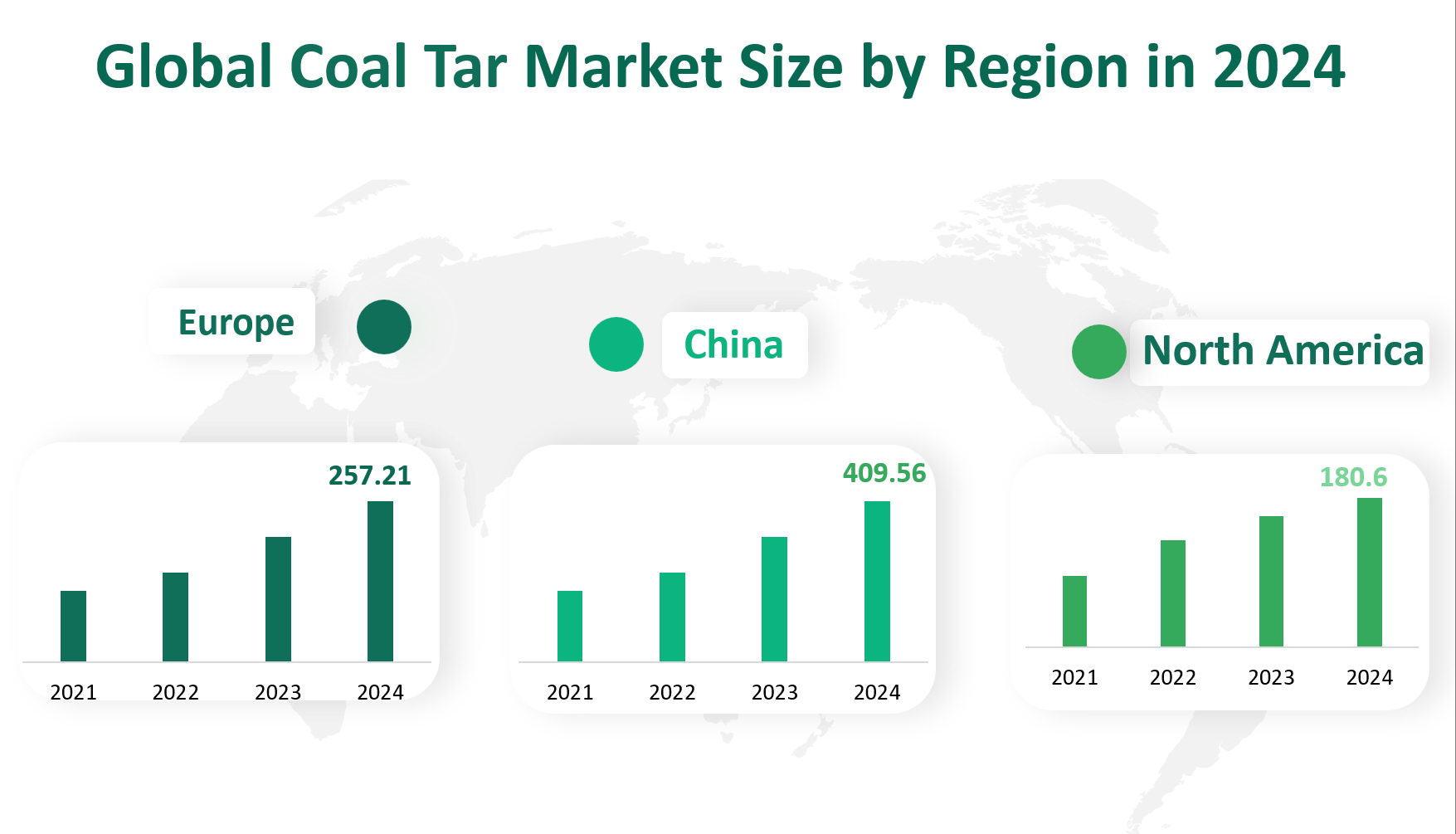1. Global Coal Tar Market Insight Analysis
The global Coal Tar market is projected to reach a value of 1,134.62 million USD by 2024, with a steady Compound Annual Growth Rate (CAGR) of 2.80% from 2024 to 2033.
Coal Tar, a by-product of the coal gasification and coke production processes, is a complex mixture of highly aromatic hydrocarbons. It contains polycyclic, fused ring compounds with or without side chains and heterocyclic compounds that include oxygen, sulfur, and nitrogen. Coal Tar is typically used as a raw material for processing and refining to produce various chemical products. It can also be directly utilized in applications such as industrial coal binders, coke production, and as a component in fuel oil and wood preservatives.
Figure Global Coal Tar Market Size (M USD) and CAGR (2024-2033)

2. Driving and Limiting Factors of Coal Tar Market Growth
The growth of the market is influenced by several key factors. Economic development in major regions such as China, North America, and Europe has significantly boosted the market. The expansion of the chemical industry and the increasing demand in downstream applications like road construction, fuel production, and chemical manufacturing have driven market growth. For instance, China’s robust industrial base and continuous investment in infrastructure have led to a large demand for Coal Tar, making it the largest market globally.
Additionally, technological advancements in the production and processing of Coal Tar have improved efficiency and product quality, further supporting market expansion.
However, this market also faces several limiting factors. Environmental regulations have become increasingly stringent, particularly in developed regions. The production process of Coal Tar generates pollutants, which has led to stricter environmental policies and higher compliance costs for manufacturers. This has constrained market growth in some areas.
Additionally, the high labor costs in regions like North America and Europe have added to production expenses, making it challenging for companies to maintain profitability. Moreover, the market is highly competitive, with a large number of players vying for market share. This competition has led to price pressures and limited profit margins for many companies.
3. Technology Innovation and Corporate Mergers and Acquisitions in Coal Tar Market
Technological innovation has played a crucial role in the development of the Coal Tar market. Advances in processing technologies have enabled the extraction of higher-value chemicals from Coal Tar, enhancing its applications in various industries. For example, new hydrogenation techniques have allowed the production of high-cetane diesel from Low Temperature type, making it a viable alternative to traditional fuels.
Additionally, improvements in distillation processes have increased the yield and purity of chemical products derived from Coal Tar, such as phenols and naphthalenes.
Corporate mergers and acquisitions have also significantly impacted this market. In recent years, several major players have engaged in strategic alliances and acquisitions to expand their market presence and enhance their product portfolios. For instance, the merger of China Guodian Corporation and Shenhua Group to form China Energy Investment Corporation has created one of the world’s largest energy enterprises.
This merger has not only strengthened the company’s position in the Coal Tar market but also provided significant synergies in terms of resources and technology. Similarly, ArcelorMittal’s long-term supply agreement with Koppers Inc. has ensured a stable supply of Coal Tar for the production of wood preservatives, highlighting the importance of strategic partnerships in the industry.
4. Global Coal Tar Market Size by Type
Coal Tar can be categorized into three primary types based on the temperature at which it is produced: High Temperature, Medium Temperature, and Low Temperature.
High Temperature (HTCT) is produced during the coke-making process at temperatures exceeding 900°C. It is characterized by its high aromatic content and complex chemical structure, making it suitable for the extraction of various valuable chemical products. HTCT is the most widely used type of Coal Tar, primarily due to its versatility and the high demand from downstream industries such as chemicals, plastics, and fuel production.
In terms of market value, HTCT is projected to hold the largest share in 2024. The global market value of HTCT is expected to reach USD 642.31 million by 2024.
Medium Temperature (MTCT) is produced at temperatures ranging from 600°C to 900°C. It shares some similarities with HTCT but has a higher content of phenolic compounds and lower aromatic hydrocarbons. MTCT is primarily used in the production of liquid fuels and as a raw material for the chemical industry. The market value of MTCT is projected to reach USD 270.83 million by 2024.
Low Temperature (LTCT) is produced at temperatures below 600°C. It contains a higher proportion of lower phenols, which can be extracted and used as chemical raw materials. LTCT is also a valuable feedstock for the production of high-cetane diesel through hydrogenation processes. The market value of LTCT is forecasted to be USD 221.48 million by 2024.
Table Global Coal Tar Market Size by Type in 2024
Market Size (M USD) 2024 | |
High Temperature | 642.31 |
Medium Temperature | 270.83 |
Low Temperature | 221.48 |
5. Global Coal Tar Market Size by Application
Coal Tar finds extensive use across various industries due to its rich chemical composition and ability to be processed into numerous valuable products. The primary applications include Carbon Black, Pitch, Wash Oil, and others.
Carbon Black is a material produced by the incomplete combustion of heavy petroleum products, including Coal Tar. It is widely used in the production of tires, rubber products, and pigments due to its excellent reinforcing and UV protection properties. The market value of Carbon Black is projected to reach USD 375.08 million by 2024.
Pitch, derived from Coal Tar, is a viscoelastic polymer used in various industrial applications. It is a key component in the production of electrodes for steelmaking and in the formulation of asphalt and roofing materials. The market value of Pitch is expected to reach USD 497.76 million by 2024.
Wash Oil is a by-product of Coal Tar distillation, used primarily as a solvent in the chemical industry and as a fuel oil component. It is also used in the production of wood preservatives and other specialty chemicals. The market value of Wash Oil is projected to be USD 94.40 million by 2024.
Table Global Coal Tar Market Size by Application in 2024
Application | Market Size (M USD) 2024 |
Carbon Black | 375.08 |
Pitch | 497.76 |
Wash Oil | 94.40 |
Others | 167.38 |
6. Global Coal Tar Market by Top Regions
China remains the largest regional market by revenue, with a projected market value of 409.56 million USD in 2024. This position is attributed to China’s robust industrial base, particularly in the steel and chemical industries, which are major consumers.
Europe is the second-largest market, with an estimated value of 257.21 million USD in 2024. The region’s market growth is driven by its advanced chemical industry and strong demand from downstream sectors such as automotive and construction.
Japan is another significant market, with a projected value of 134.07 million USD in 2024. The country’s market growth is supported by its advanced industrial technology and strong demand from the steel and chemical sectors.
North America is expected to have a market value of 180.6 million USD in 2024. The region’s market is driven by its strong industrial base, particularly in the steel and chemical industries. The United States’ economic stability and investment in infrastructure have supported the demand.
India is one of the fastest-growing regional markets, with a projected value of 70.91 million USD in 2024. The country’s rapid economic growth, expanding industrial sector, and increasing demand from downstream industries such as construction and automotive have driven market expansion.
Figure Global Coal Tar Market Size by Region in 2024

7. Global Coal Tar Market Analysis by Major Players
7.1 ArcelorMittal S.A.
Company Introduction and Business Overview: ArcelorMittal is a leading global steel and mining company with operations in Europe, North and South America, Asia, and Africa. The company produces a wide range of steel products, including flat and long products, and operates through segments such as NAFTA, Brazil, Europe, ACIS, and Mining.
Products: ArcelorMittal’s Coal Tar products include High Temperature Coal Tar, Medium Temperature Coal Tar, and Low Temperature Coal Tar. These products are used in various applications, including the production of coke, chemicals, and fuel oil.
7.2 JFE Holdings, Inc.
Company Introduction and Business Overview: JFE Holdings is a major Japanese steel manufacturer with a strong presence in steel manufacturing, engineering, and trading. The company operates through segments such as Steel, Construction, Trading, and Others.
Products: JFE Holdings’ Coal Tar products are derived from the distillation of coal tar and crude benzenes. These products are used in various industries, including the production of high-quality intermediate materials, benzene, toluene, and xylene.
7.3 China Baowu Steel Group
Company Introduction and Business Overview: China Baowu Steel Group is a leading steel producer in China, offering a wide range of iron and steel products, including carbon steel, stainless steel, and special steel. The company operates through segments such as Iron and Steel, Coal Chemical, and New Energy.
Products: China Baowu Steel Group’s Coal Tar products include High Temperature Coal Tar, Medium Temperature Coal Tar, and Low Temperature Coal Tar. These products are used in various applications, including the production of chemicals and fuel oil.

